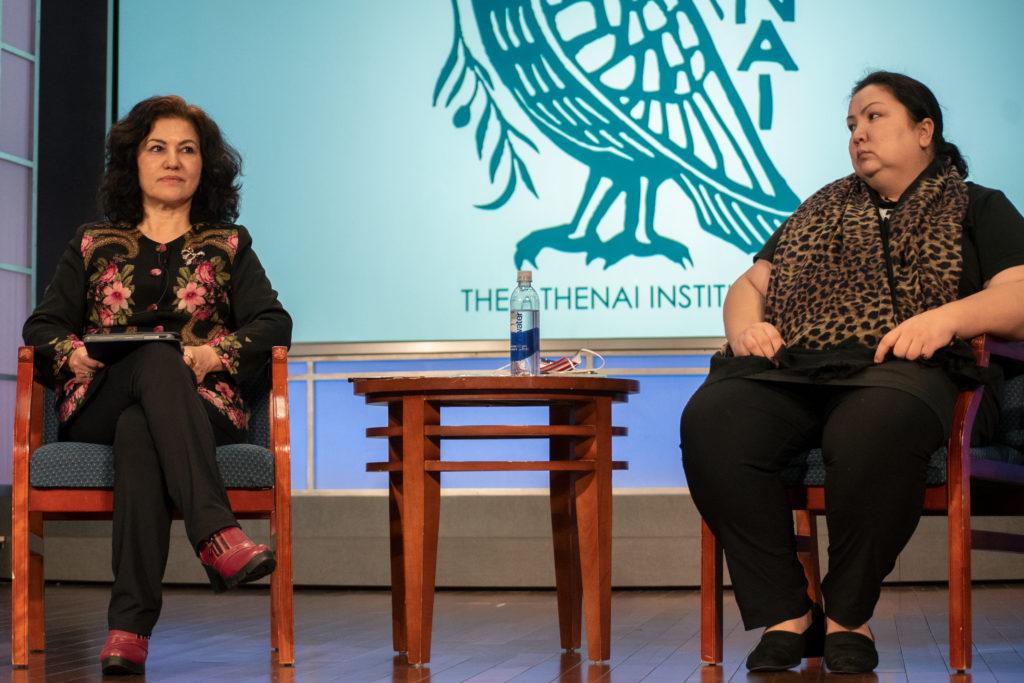Two Uyghur human rights activists who experienced persecution by the Chinese government discussed financial divestment from the companies that reportedly profit on Uyghur forced labor at a discussion Tuesday.
The pair spoke about personal tragedies they’ve experienced actions students can take to end financial support of the genocide individually and at GW. The event was moderated by Elise Anderson, the senior program officer for the Uyghur Human Rights Project – an NGO promoting Uyghur human rights – and was hosted by the Athenai Institute, a student-run non-profit, and sponsored by College Democrats, College Republicans and the GW Uyghur Divestment Committee.
Rushan Abbas, the founder and executive director of Campaign for Uyghurs, a human rights organization, works to raise awareness of the genocide in the United States. She said her sister was imprisoned as a result of her non-profit work.
“I am sitting here and talking to you at the cost of my own sister’s freedom,” Abbas said. “My sister, Dr. Gulshan Abbas, is a retired medical doctor who was taken only six days after my first public speech.”
Abbas said students can pressure lawmakers to strictly enforce the Uyghur Forced Labor Prevention Act, a law passed in 2021 aimed at banning goods produced with Uyghur forced labor in the United States. The law does not make companies ensure that goods outside of East Turkestan are not produced through forced labor, which led some human rights organizations to criticize the legislation.
“Cutting off any kind of deals that the University makes with cotton or t-shirts or anything that the University purchases, that’s going to help and that’s where we can start by pressuring the University, the president, and the decision makers and then supporting that we have the Uyghur Forced Labor Prevention Act that’s signed and it’s a law right now,” Abbas said. “But unless we push for the implementation of it, it means nothing.”
The event coincided with the creation of an online petition with over 360 signatures demanding GW divest from companies profiting from forced labor practices.
Abbas said the 1985 anti-Apartheid GW student protest encouraged the University to financially divest from profits earned through the South African regime to spur students to do the same today. GW never publicly divested from Apartheid-related investments due to the riskiness of the new stock portfolio.
“Divestment is not a new concept for GWU, and now you are doing the same thing again as GWU students took part in protest in 1985 against the Apartheid and called for divestment – divestment is critical – the evidence is overwhelming,” she said. “China is using Uyghurs in forced labor programs as modern day slavery. For their ongoing genocide, they have created a profit motive, a financial incentive to continue their genocide.”
Zumrat Duwat, a survivor of Uyghur concentration camps in East Turkestan and a human rights advocate, said she experienced beatings and other forms of physical and mental abuse in the concentration camp.
“When I initially came, I shared my bread with an elderly diabetic woman – as a result, I was cruelly beaten by the guard. The woman screamed and begged the officer to stop telling him that I didn’t understand the rule. I also screamed ‘Oh god’ from the pain of the stress,” she said.
Duwat said the Chinese government conducts forced sterilization as part of its campaign against the Uyghur people. Compulsory sterilization is considered a crime against humanity by the International Criminal Court, of which China is not a member.
“I felt as if I was being led to a slaughterhouse,” she said. “The process began with me being connected to an IV, which caused me to lose consciousness. When I woke up, I was in excruciating pain – when I looked around, I noticed there were other women in the room who were also crying in misery. I can’t put into words how I felt when I woke up. I was absolutely dehumanized.”
The State Department accused the Chinese government of sponsoring mass forced labor programs that force Uyghurs to produce goods that may end up in the United States in July 2021.
“After they detained, I was forced into labor,” Duwat said.
Duwat called on students to volunteer with or donate to organizations like the Uyghur Human Rights Project and the Campaign for Uyghurs to help spread information about crimes against humanity in China and help Uyghur communities and migrants in the United States.
“So what I am asking you, like Sister Rushan just said, is to spread the news, the credible news, about Uyghurs on social media, and please also organize events like this today to enable more and more students to know about what’s really happening to Uyghurs,” she said.








